The Writing Life of: Chris Bridge
Chris Bridge
This week on ‘The Writing Life of:‘ I am thrilled to be interviewing author Chris Bridge. Chris will be sharing with us detail of his writing life, telling us all about his latest book ‘Girl Without a Voice‘, which was released on 20th March 2018, and answering a few fun questions too.
So without further ado I’ll hand you over to Chris. Post contains affiliate links.
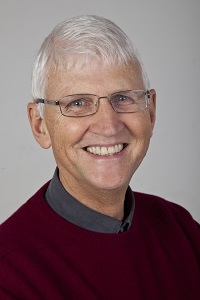
Chris Bridge was born in Hull in 1947. He studied English (and Philosophy) at Nottingham University. His career has been in teaching, eventually becoming Headteacher of Huntington School, York.
In 2006 he was appointed a National Leader of Education. His first novel Back Behind Enemy Lines was published by Peach Publishing in 2014. It has received considerable acclaim and was listed for the Historical Novel Society Indie Prize. It rose to be 7th in the Amazon Australian Best sellers list and 173rd in the UK list. In February 2017 his first collection of Poetry, Walking Through, was published by Graft Poetry.
Chris lives in North Yorkshire and can frequently be found working as a volunteer on the Operations Team for the Yorkshire Arboretum, where he is also a Trustee.
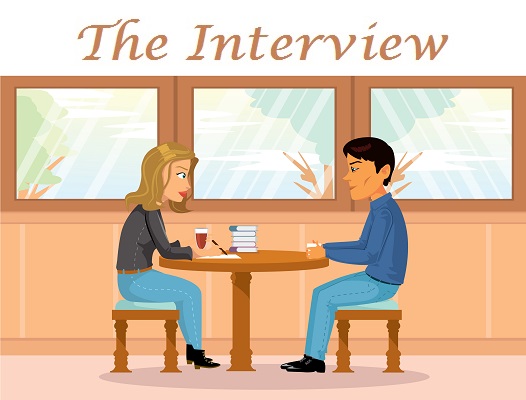
1) As a child what did you want to do when you grew up?
I stammered badly as a child so a whole range of careers were, I thought at the time, impossible. But words that I could rarely say, often sang to me. I remember the whole of my school was compelled to watch a film of T.S. Eliot’s Murder in the Cathedral. They were bored. I was entranced.
2) Who were your favourite childhood authors?
My mum loved Beatrix Potter and read those tales to us. I loved Winnie the Pooh, but I quickly moved onto adult books. Was it the dullness of being locked up in boarding school all weekend that made me a voracious reader? I don’t know. By 17 I’d read everything that D.H. Lawrence ever published, (every novel, novella, letter, poem or essay) as well as most of Thomas Hardy, Dickens, Shakespeare etc. I was a weird child.
3) At what point in your life did you realise you wanted to be a writer?
I didn’t let myself realise this until I retired from my profession as teacher and then headteacher. Until then I wrote furtively, mostly poems, really just for myself, although I did write school plays and a school musical called Cotton On. That was special because we took up to the Edinburgh Fringe and sold out! Two ex-pupils are still in touch with me from that time. The Scotsman compared me with Brecht. I liked that.
4) How did you go about following that dream?
I retired ten years ago. I’d had an idea for a novel in my head for a long time so I wrote it. It was about a conman who became a headteacher and I called it Adding Noughts to Zeros. The title was the best thing about it. It was poor and no agent was interested. Later I split it into two separate novels, both also still unpublished. Three novels later I was beginning to get the hang of what it really means to write.
Meanwhile rejection letters were piling up. (I always find naming characters difficult. Most of my unpleasant characters are named after those who rejected me!) I got lucky with Sheil Land. Sonia Land read part of Fun-da-mental and, on that basis, agreed to read Back Behind Enemy Lines. Failing to find a mainstream publisher, she published it herself.
5) What is your writing day like? Do you aim for a certain amount of pages or words before you stop for the day?
For ten years now I have written between 1 and 2 thousand words a day. I write first thing in the morning before a late breakfast. I start by reading over what I wrote yesterday. I’ve learnt to recognise that if I don’t like what I read I will write better today.
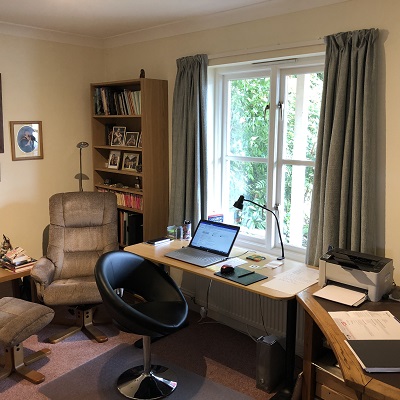
Where Chris Writes
6) Did you ever consider writing under a pseudonym?
Not yet, but I might like to develop another persona, someone younger?
7) Do you have any strange habits before starting, or whilst in the midst of writing?
Mugs. Before I start to write a new novel I buy a new coffee mug. It takes time to find the right mug and yet there’s no obvious link with what I am writing about. Back Behind Enemy Lines was written with a mug of Glencoe’s 3 sisters. There was no connection in subject matter whatsoever, but I had to drink from that mug when writing that novel. Girl Without a Voice was written with an RSC mug I bought in 2016. If my present Go Away I’m Writing mug is unwashed the next morning I rescue it from the dishwasher and re-use it. If you don’t understand this, then nor do I.
8) Do you write longhand, typewriter, or on a computer?
Computer every time. I love navigation panes and the ability to make instant changes. I quickly learnt to date and save everything so I can always go back to what I changed.
9) How many books have you written? Do you have any unpublished work?
I have had two novels published out of a total of seven I’ve completed. Three others are quite good. I hope to publish them soon.
10) Are you a plotter or a pantser?
I think it’s important to be both. I start with a notebook and a writing plan already split into chapters. The same note book has notes on characters, their age, appearance, mannerisms etc. So I can stay consistent. Before I start writing I have to know where I am going, but I never actually follow all of the plan. In writing Girl Without a Voice for instance at one point I wrote a scene that shocked me. It was something I hadn’t planned but somehow my characters had got to this point and the whole book turned and was all the better for the new direction. If your characters change your direction you know the book is alive.
11) Do you read all the reviews left for your book(s)?
All of them. The reviews have always been good. My favourite was an Australian who wrote that he read books to send him to sleep, that the process usually took fifteen minutes. With my novel it didn’t work: he had to keep reading. Professional reviews like yours always teach you something about what you’ve written.
Concerning your latest book:
Publisher – Peach Pub
Pages – 225
Release Date – 28th March 2018
Format – ebook

Childhood trauma robs Leah of the power of speech and forces her to be a watcher on the margins of society. But when her mother goes in search of the child she gave up for adoption, Leah is tempted out of the shadows.
At first Patrick is everything she could hope for from a half-brother, but is he too good to be true? Leah makes a shocking discovery that leaves her with a moral dilemma and the need to take on not only her half-brother but the ruthless cult he belongs to.
12) How long did it take you to get from the idea’s stage to your date of publication?
Nearly 4 years. I began Girl Without a Voice in November 2014. It was published March 2018. In that period I rewrote it several times. I dropped or transposed whole sections. I changed it from the past to the present tense to make it more immediate.
13) How did you come up with the names for your characters?
Names are incredibly difficult. They have to ring true. My main character is called Leah. It speaks of her being unloved and unregarded. It’s biblical which hints at something in her mother’s past. I needed a name for an unsuccessful second-hand bookseller so he became Martin because it’s a run-of-the-mill name that does not call attention to itself. The mother is Isabel (another Bible name) but I shortened this to Izzy because it’s like dizzy. Leah calls her mother Izzy which tells you a lot about their relationship.
14) Can you give us an insight into your main character(s) life?, What makes them tick?
Leah is mute. Childhood trauma robbed her of the power of speech. She exists on the margins of society. Even her family take no notice of her. But she is highly intelligent and, because she never speaks, she is a close observer of others. This makes her the perfect narrator. She has also developed the ability to listen to buildings and feel their mood. She loves her mother, but the secret she discovers will ruin her mother’s happiness. That is her dilemma.
Martin is Leah’s lover. They have wordless sex together. In him I created a confused young man who lives his life through books. These two have an uneasy partnership. When Leah’s world slips out of joint I wanted to set two of the least likely characters to try to set it right.
15) Which was your hardest scene to write?
The prelude, the act of bullying that strikes Leah dumb right at the beginning of the book. So much depends on it. Beginning are always tough.
16) How did you come up with the title of your book?
My agent suggested it. I wanted to call the book Long Lost. In the ITV series the discovery of a long lost member of the family always brings joy and no one asks if they will be added into the will or upset the balance of family relationships. I thought it would be interesting to send a wrecking ball of a lost child into an already dysfunctional family.
17) Did you get a family member/friend to read your work before sending to the publishers?
Yes. Both. I rely on Sheila my wife and Patrick who is a good friend and nothing like the character in the book who bears the same name.
18) What process did you go through to get your book published?
I sent it to my agent. She loved it the moment she read it. I have her email on my wall.
19) What did you do once you had written the final word in your book?
I worried if anyone would read it or like it. There isn’t a celebratory moment.
20) What’s next for you, writing-wise?
I’m just finishing the sequel to Girl Without a Voice. It’s called Putting on Shoes. It features the same characters. The tile comes from what Mark Twain said: A lie can travel half way around the world while the truth is putting on its shoes.
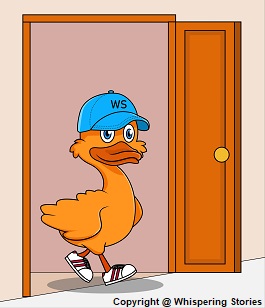
1) What’s your favourite food?
Blueberries
2) If you had a box of crayons and you could only choose one, which colour would you choose?
Green
3) What movie could you watch over and over again?
Casablanca
4) What would be the top song on your playlist?
Katie Melua, Call off the search
5) If you won millions, what would be your first purchase?
A nature reserve.
6) A talking duck walks into your room wearing a baseball cap and sunglasses, what’s the first thing he says to you?
‘Don’t look at me like that. The heron ate your goldfish.
You can find out more about Chris Bridge by visiting the website/social media sites below.
I would like to say a big thank you to Chris Bridge for sharing with us details of his writing life, and for a wonderful interview.

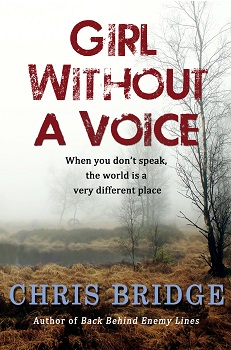
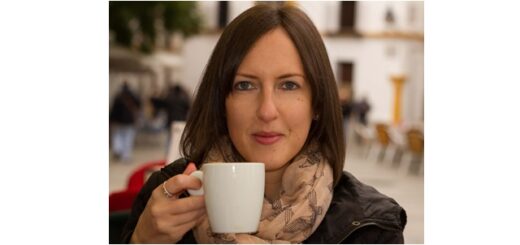
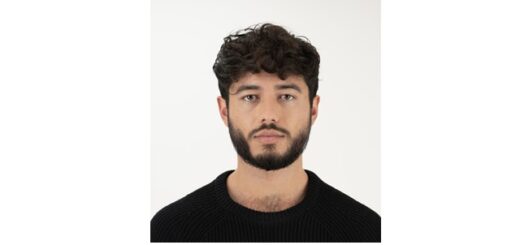
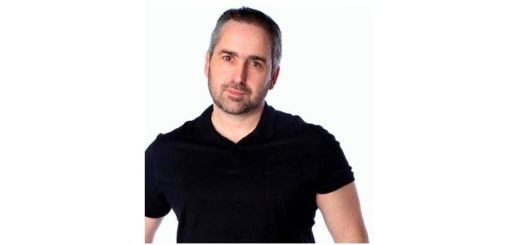

great interview writing as a no age limit
Great interview!
What a wonderfully detailed interview! Also, the plot of the book seems very unique.
Great interview! Chris sounds like a wonderful writer and his book sounds like a story I would enjoy.
Great interview! It’s always a treat to learn a bit about the authors.
Great interview.
Great interview!
Great interview. Girl Without a Voice sounds interesting.
I always think the most telling answer are in the “Fun Stuff” section
Great interview, I love learning about authors
Thank you. Glad you enjoyed it
Thank you.
Thank you. I agree about the plot.
Thank you. I agree that his book sounds enjoyable.
Thank you. Glad you like the interview and learnt a lot about Chris.
Thank you.
Thank you.
Thank you. I agree, the book does sound interesting.
Thanks. Lots of people love the Fun Section the best.
Thank you. I love learning about authors lives too.
Great interview! Blueberries are an interesting favorite food choice!
Thanks Heidi. I hate blueberries, I don’t like the squelch they make when you bite into them.
Great post and interview, I really love when you do The Writing Life feature on your blog. I really love finding new authors and books to read. Thank you so much for sharing your awesome post.
Thank you , I’m so happy that you like my weekly interviews.